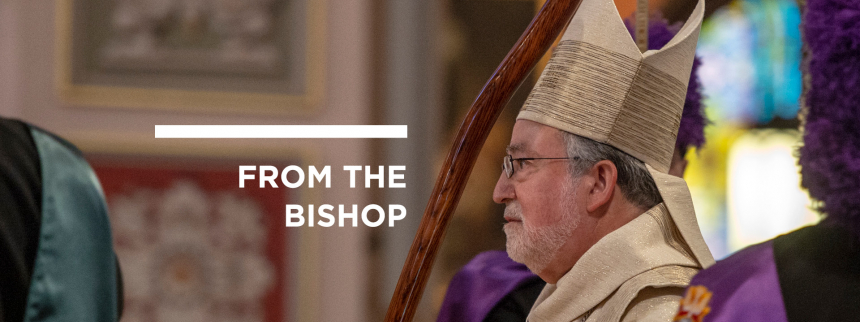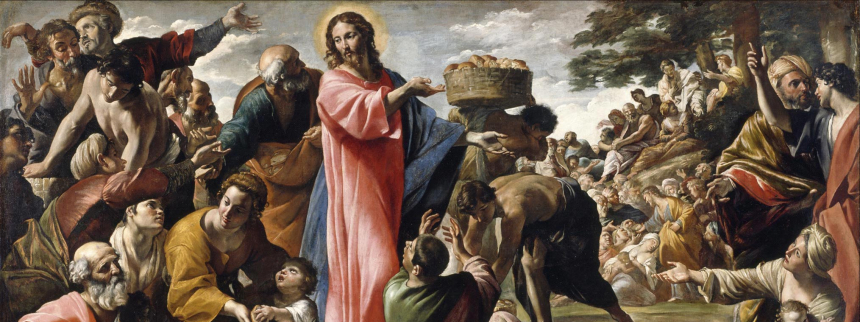
Many Catholics in the Diocese of Sacramento will have received a copy of the prayer card for the Synod listening sessions. The front panel of the card presents a dramatic interpretation of Jesus’ multiplication of the loaves and fishes. The cards are intended to assist parishes participating in the initial consultation phase of the global Synod of Bishops scheduled for October 2023. The Holy Father, Pope Francis, is asking Catholics to consider how we walk together as the people of God. In particular, he wants us to examine how we use the existing structures of the Church to listen, learn and act together as the body of Christ.
For the Diocese of Sacramento, this work is primarily done through parish pastoral councils, the Diocesan Pastoral Council and other consultative and governing bodies working in the north state. These structures have generally served us well over the years, but we can do better. The Holy Father’s invitation to the universal Church is a provident opportunity to examine together, in a spirit of prayer and respectful listening, how we can heed more attentively the voice of the Good Shepherd and walk together as his disciples. This is not a democratic process; it is a discernment process. We do not seek to find that upon which we all agree, but to find where the Lord Jesus is leading us.
The painting of the Lord’s miracle is meant to remind us that all our work as Catholics is an extension of the Lord’s own labor of mercy. The picture presents a dynamic scene. Jesus and his disciples are surrounded by a hungry group eager for the bread to be distributed. The moment captured in the painting shows only one basket. The task seems paltry in the midst of so many, yet we know that the humble gesture of generosity would provide an abundance of mercy to the weary multitude.
Turning to the pages of Matthew’s account from which the artist drew his inspiration (Mt 14:13-21), there was an essential yet fleeting moment that preceded the distribution. Jesus and his disciples discussed together what they would do with the large hungry crowd that pressed in against them. We often listen to the story with the foreknowledge of the miracle to come. Suspend for a moment the assuring knowledge of the outcome and imagine yourself in the disciples’ place, their hearts filled with uncertainty and worry. The disciples’ suggestion to dismiss the crowd came from such distress.
Even Jesus may not have been sure of the outcome. He was the divine Son of God, but he also was a man, a human being. He expressed his divinity within the limitations of his own human nature. The conversation with his disciples helped him learn and discern the Father’s will during that anxious episode.
After listening and learning from his disciples, Jesus decided to share what little he and his friends had, five loaves and two fish. He generously shared this because it was the just and merciful thing to do. The Lord took the meager portions of food into his hands, lifted his eyes to heaven, gave thanks, and then broke the bread because his heart was moved with pity for the vast crowd. The Holy Spirit, cooperating with the obedient Son of the Heavenly Father, made abundantly fruitful the humble work of mercy Jesus performed.
True to the human condition of which he was a part, Jesus made a decision and took action in a moment of uncertainty. Harmonizing his human nature with his divine identity, he performed a great work of mercy trusting in the Father’s fidelity.
Our belief in the divinity of Jesus should not diminish our belief in his humanity. This is the confounding mystery and astounding beauty of the Incarnation. The Divine Word of God became flesh and made his dwelling among us. He humbled himself “becoming obedient to death, even death on a cross.” (Phil 2:8) The perplexing paradox of the Incarnation is that the Lord’s humble obedience to the Father is what most reveals the glory of his divinity. The culminating moment of divine glory was his obedience on a cross. This same humility is seen in the generosity of Jesus despite the seeming poverty of his circumstances.
This should prompt us to probe more readily the humanity of Jesus so that we may marvel at the divinity revealed in the ordinary lowliness of human nature. This will open the meaning of Jesus’ words to the disciples during the washing of the feet in the Gospel according to John, “I have given you a model to follow, so that as I have done for you, you should also do.” (Jn 13:15) The more we contemplate and imitate the humanity of Jesus, so the more will we come to share in his divinity.
Considering Jesus in conversation with his disciples, the Lord sets before us an example of how we are to enter the synodal process. We are fortunate to have many of the structures which will facilitate the synodal process in the Diocese of Sacramento, but we may have lost sight of how these structures should enable us – the faithful, religious, bishops, priests and deacons – to listen and learn from one another so that we may more clearly heed the voice of Christ.
As the Lord’s conversation with his disciples led to the extraordinary work of mercy among the multitude, he now eagerly waits to join our conversations. Listening intently to one another, we will do as the Lord Jesus did with his disciples. Imitating his humble manner will allow his wisdom and charity to guide us. In this manner our decisions and actions may become those of the obedient Son of the Father.


